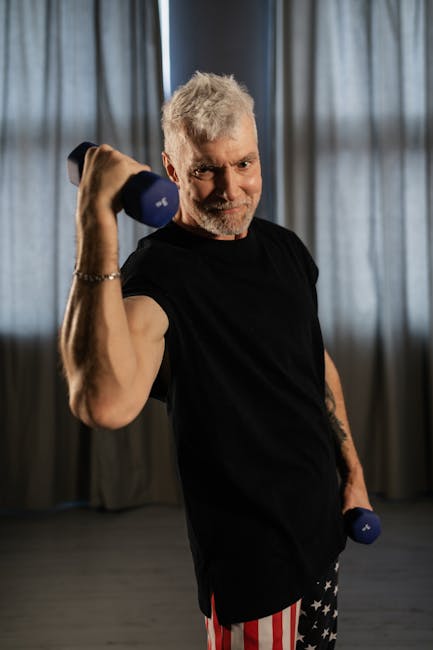
Forget the stereotypes. Forget the notion that peak physical prowess fades with the arrival of grey hairs. At 50, when many consider winding down, I decided to step onto the bodybuilding stage. And now, at 63, I’m not just maintaining; I’m stronger, more vital, and more connected to my body than ever before. This isn’t just my story; it’s a blueprint for defying age and redefining what’s possible.
The Spark: Why a Bodybuilding Competition at 50?
For years, fitness had been a constant in my life, but the idea of competitive bodybuilding felt like a young man’s game. However, a milestone birthday and a nagging sense of ‘what if?’ ignited a new ambition. I wasn’t chasing a pro card; I was chasing a personal challenge, a testament to what disciplined training and nutrition could achieve at any age. I wanted to prove that our physical prime isn’t always behind us – sometimes, it’s just waiting to be discovered.
My 50s Training Philosophy: Smart, Not Just Hard
My training approach wasn’t about out-lifting twenty-somethings. It was about outsmarting the aging process. I focused on:
- Prioritizing Recovery: Sleep became my non-negotiable secret weapon. 7-9 hours was crucial for muscle repair and hormone optimization. Active recovery, like light walks or stretching, replaced endless cardio.
- Intelligent Progressive Overload: Instead of constantly chasing heavier weights, I focused on perfect form, controlled negatives, and increasing time under tension. Small, consistent increases were key to avoiding injury.
- Compound Movements with a Twist: Squats, deadlifts, bench presses, and rows formed the core, but I adapted them. Goblet squats over heavy barbells, incline presses instead of flat bench on certain days – listening to my joints was paramount.
- Periodization and Deloads: My body couldn’t handle constant maximal effort. Strategic deload weeks (reduced volume/intensity) allowed my nervous system to recover and prevented burnout.
Fueling the Machine: Nutrition for Mature Muscle Growth
Diet was, arguably, even more critical in my 50s. My metabolism wasn’t as forgiving, and recovery demanded optimal fueling:
- Protein Powerhouse: Every meal centered around a lean protein source – chicken, fish, lean beef, eggs, whey protein. I aimed for 1 gram per pound of body weight.
- Complex Carbs for Energy: Sweet potatoes, brown rice, oats, and quinoa provided sustained energy for intense workouts and refuelled glycogen stores.
- Healthy Fats are Non-Negotiable: Avocados, nuts, seeds, and olive oil supported hormone production, joint health, and overall well-being.
- Hydration and Micronutrients: Gallons of water daily and a rainbow of fruits and vegetables ensured my body had all the vitamins and minerals it needed to function optimally.
The Competition & Beyond: Thriving at 63
Stepping on stage in my 50s was an exhilarating experience. I didn’t win, but I ‘conquered’ in my own way – proving that dedication knows no age. The journey, however, didn’t end there. At 63, my strength isn’t just maintained; it feels deeper, more resilient.
My continued strength comes from:
- Adapting, Not Stopping: My training has evolved further. More focus on mobility, unilateral movements to address imbalances, and incorporating activities like yoga or Pilates for flexibility and core strength.
- Mastering the Mind-Muscle Connection: With age, focus becomes even more critical. I truly feel every rep, every contraction, maximizing efficiency and minimizing wasted effort.
- Listening Intently: Aches and pains are signals, not reasons to quit. I rest when needed, modify exercises, and prioritize longevity over ego lifts.
- A Broader ‘Why’: My motivation now extends beyond aesthetics to functional strength, bone density, mental clarity, and inspiring others.
Your Blueprint for Age-Defying Strength
If you’re in your 40s, 50s, 60s, or beyond, and think your best lifting years are behind you, think again. Here are my key takeaways:
- Start Small, Think Big: Don’t try to replicate your 20-year-old self. Begin with fundamentals, master form, and gradually build intensity.
- Prioritize Recovery Like Gold: Sleep, nutrition, and stress management are paramount.
- Nutrition is Your Foundation: Fuel your body with high-quality protein, complex carbs, and healthy fats.
- Listen to Your Body: It will tell you what it needs. Rest when sore, push when energized.
- Mindset is Everything: Believe in your body’s capacity to adapt and grow, regardless of age. Consistency trumps intensity.
My journey from a competitive stage in my 50s to being stronger than ever at 63 is a testament to the incredible adaptability of the human body. Age isn’t a barrier; it’s merely a number on a remarkable journey. What will your next chapter of strength look like?
